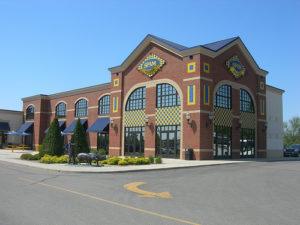Austin, Minnesota: An Autism-Friendly Town
 The Famous Hormel Historic Home
The Famous Hormel Historic Home
In my novel True Mercy, Bruce often had to worry about his son Adam’s behavior in social settings. But if the story took place in Austin, Minnesota, he would have had much less to worry about. That’s because Austin is an autism-friendly town. Ten years ago, the community used their resources to educate local business owners about autism and train them to be aware of these customers’ needs. The town even has a community autism resource specialist. Therefore, Austin’s residents are probably more aware than most about the signs of autism that my story’s character Adam displayed: intense fixation on specific topics, unusual body movements like hands flapping, echolalia (word repetition), and meltdowns caused by feeling overwhelmed.
So how did the small town of Austin make itself autism-friendly? Just go in the Hormel Historic Home, a nonprofit museum dedicated to all things Spam, the canned meat that has been produced by Hormel Foods there for 81 years. Mary Barinka works there. She once worked as a Hormel marketing executive and is now the town’s autism resource specialist as well as a museum employee. Barinka has a sixteen-year-old daughter with autism. Along with working at the museum, she handles questions and requests from parents that can range from how to give a presentation to new business owners and their employees on becoming autism-friendly, where to find a good speech therapist, and how to help a local community college launch a special autism program.
You may wonder what business owners must do to make their establishments autism-friendly. Often individuals with autism react negatively to overstimulation, so these changes can include dimming the store’s lights, lowering the music volume, and training employees to speak slowly and in short phrases, and to be prepared to have more patience than usual.
The program began when retired Hormel executive and family friend Gary Ray asked Barinka if her then six-year-old daughter was able to participate in summer camp. Barinka told him she and her husband would like her to attend camp but it was not possible because they would need the camp to understand their daughter’s special needs and they would have to hire a helper. Ray and his wife then offered a donation for Barinka to start a camp. She jumped on it. The Ray’s have since donated over $100,000 to fund more programs such as a monthly respite night with children’s activities to give parents and caregivers a break, a peer program at the high school where student volunteers to spend time with another high schooler with autism one-on-one, day camps, and of course, the museum.
Hearing about the town’s programs, new families have moved in. Barinka also gets calls for advice from other towns who would like to set up their own autism-friendly programs.
Perhaps someday I will be able to visit Austin, Minnesota. I am sure my fictional character Adam and real-life individuals with autism would thrive in this town.
Information for this post came from The Washington Post article “The town that gave the world Spam is proud to be ‘autism-friendly’ by Amy Ellis Nutt.
True Mercy can be purchased on Amazon, IngramSpark, and Smashwords.
Austin, Minnesota: An Autism-Friendly Town Read More »